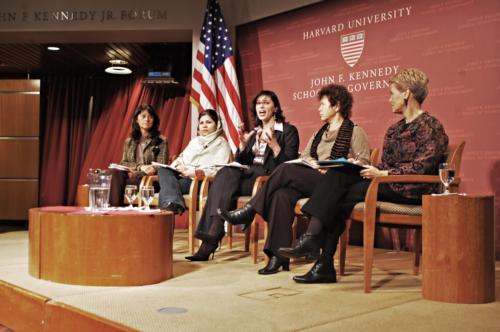
News
Summers Will Not Finish Semester of Teaching as Harvard Investigates Epstein Ties

News
Harvard College Students Report Favoring Divestment from Israel in HUA Survey

News
‘He Should Resign’: Harvard Undergrads Take Hard Line Against Summers Over Epstein Scandal

News
Harvard To Launch New Investigation Into Epstein’s Ties to Summers, Other University Affiliates

News
Harvard Students To Vote on Divestment From Israel in Inaugural HUA Election Survey
K-School Organizes Conference for Women
Four-day program connects women with public policy makers

Thirty women from war-torn countries discussed the role of women in peace building Wednesday as a part of a four-day program aimed at bringing women leaders together to shape public policy.
“We share a common goal, which is that security isn’t about tanks and soldiers, it’s about the ability to go to school, to get help, to get food,” said Wazhma Frogh, a gender and development specialist in Afghanistan.
The panel, titled “Engendering Peace: Security Through an Inclusive Lens,” featured four women from Afghanistan, Israel, Colombia, and Palestine at the John F. Kennedy Jr. Forum on Wednesday night. Other participants included reporters, human rights lawyers, and grassroots organizers.
The talk was part of the annual Women and Security Executive Program, which explores the ability of women to seek out compromise during times of intense conflict.
“I think that men are more willing to take risks with war than with peace,” said retired Israeli general Israela Oron. “Peace is very risky, you know, but women are better at taking risks for peace.”
The panelists compared their efforts to improve security, which included the experiences of the first female Colombian minister of defense and a young Afghan’s social activism beginning at age 17.
The proper role of the international community in protecting women during conflicts was also discussed.
Amal Jadou, the director general of international affairs for the Palestinian president, said that arriving at security is more complex than ending violence.
“To talk about the security issue is not an easy issue for the Palestinian woman because there are different layers of insecurity,” she said, referring to the Israeli-Palestinian conflict and its effects on Palestinian society.
Jadou and Oron both said that although it was hard for them to accept one another’s positions, they could relate to each other because they are women.
But program participant Maria-Emma Wills said their gender was not the key to holding a dialogue.
“I do not think that women, per se, are more peaceful than men,” said Wills, who works to educate Colombians about their country’s decades-long conflict between leftist guerillas, paramilitaries, and the government.
She added, however, that taking gender into account may facilitate negotiations.
In addition to the panel, the Women and Security Executive Program hosts other sessions about security and public policy in conjunction with Harvard faculty.
—Staff writer Sarah J. Howland can be reached at showland@fas.harvard.edu.
Want to keep up with breaking news? Subscribe to our email newsletter.
